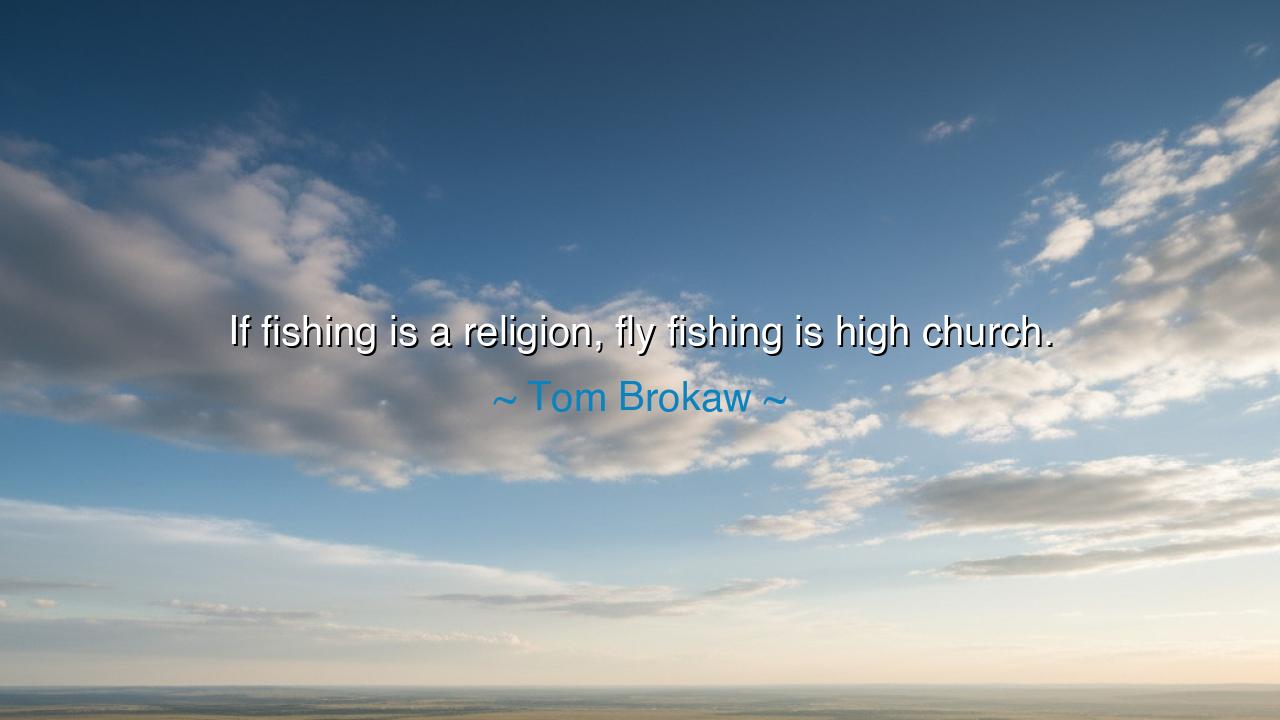
If fishing is a religion, fly fishing is high church.






Tom Brokaw, in words as clear as a mountain stream, once declared: “If fishing is a religion, fly fishing is high church.” In this saying, he captures not only the quiet nobility of a pastime, but also the sacred longing within the human heart to touch something beyond itself. For to many, fishing is not a mere hobby—it is a communion with the waters, the silence, and the patience of nature. And if this is so, then fly fishing, with its grace and precision, is not just communion, but liturgy—the high church of the angler’s faith.
The ancients, too, saw divinity in rivers and streams. To the Greeks, rivers were gods; to the Celts, they were spirits of fertility and renewal. To cast one’s line was not only to catch food, but to converse with the sacred waters. Brokaw’s words remind us that in our age of machines and noise, the river remains a temple, and the art of fishing a ritual. Yet fly fishing stands above, for it demands not only patience, but skill, mindfulness, and an almost spiritual presence. It is the cathedral within the larger faith, where every cast is a prayer, every rhythm a hymn.
Consider the story of Izaak Walton, author of The Compleat Angler, written in the seventeenth century. Walton saw fishing not only as the catching of fish, but as the cultivation of peace, humility, and contemplation. His book became not merely a guide, but a philosophy—a testament that in casting a line, one casts away vanity and pride, learning instead the virtues of patience and harmony with nature. If fishing is indeed a religion, Walton was its prophet, and his quiet wisdom still draws disciples to the waters.
Fly fishing, however, adds another layer: it is not brute force or mere bait, but artistry. The fisherman ties flies by hand, imitating the insects that hover over streams, weaving thread and feather with care. Each fly is a symbol, each cast an offering. The angler must read the waters as a priest reads sacred texts, discerning where the trout lies hidden, watching the ripple and the current with reverence. Success is not measured in fish alone, but in the grace of the act itself. Here lies the meaning of high church: not greater reward, but deeper reverence.
This truth extends beyond rivers. Brokaw’s quote teaches that in every craft, there is a difference between mere practice and devotion. One may labor at a trade, but when one enters with reverence, with full heart and presence, the labor becomes worship. Whether it is music, painting, teaching, or raising a family—when done with artistry, discipline, and love, it becomes the high church of that endeavor. Fly fishing is but the mirror of this greater principle.
The lesson is this: seek not only to live, but to live with reverence. Whatever your craft or calling, approach it as though it were a cathedral. Do not rush, do not treat it as mere means to an end, but let it shape your soul. Just as the fly fisherman waits in patience, casting with grace until fish and river yield their gifts, so must you learn to wait upon life’s currents with calm and courage. For in that waiting, in that rhythm, the soul is refined.
Practical actions follow: take time to make your work an art. Slow down. Pay attention to detail. Approach even simple tasks—preparing a meal, writing a letter, walking in nature—as though they were part of a sacred liturgy. And when possible, return to the rivers, the forests, the quiet places, for there the high church of nature still whispers its sermons.
O seeker, remember Brokaw’s wisdom: fishing is a religion, fly fishing is high church. Life itself may be the religion, but how you live it—whether with clumsy haste or with reverent artistry—determines whether you dwell in the outer courts or in the inner sanctuary. Choose the high church. Cast your line with patience. Live your days with reverence. And the river of life will grant you not only its fish, but its peace.






AAdministratorAdministrator
Welcome, honored guests. Please leave a comment, we will respond soon